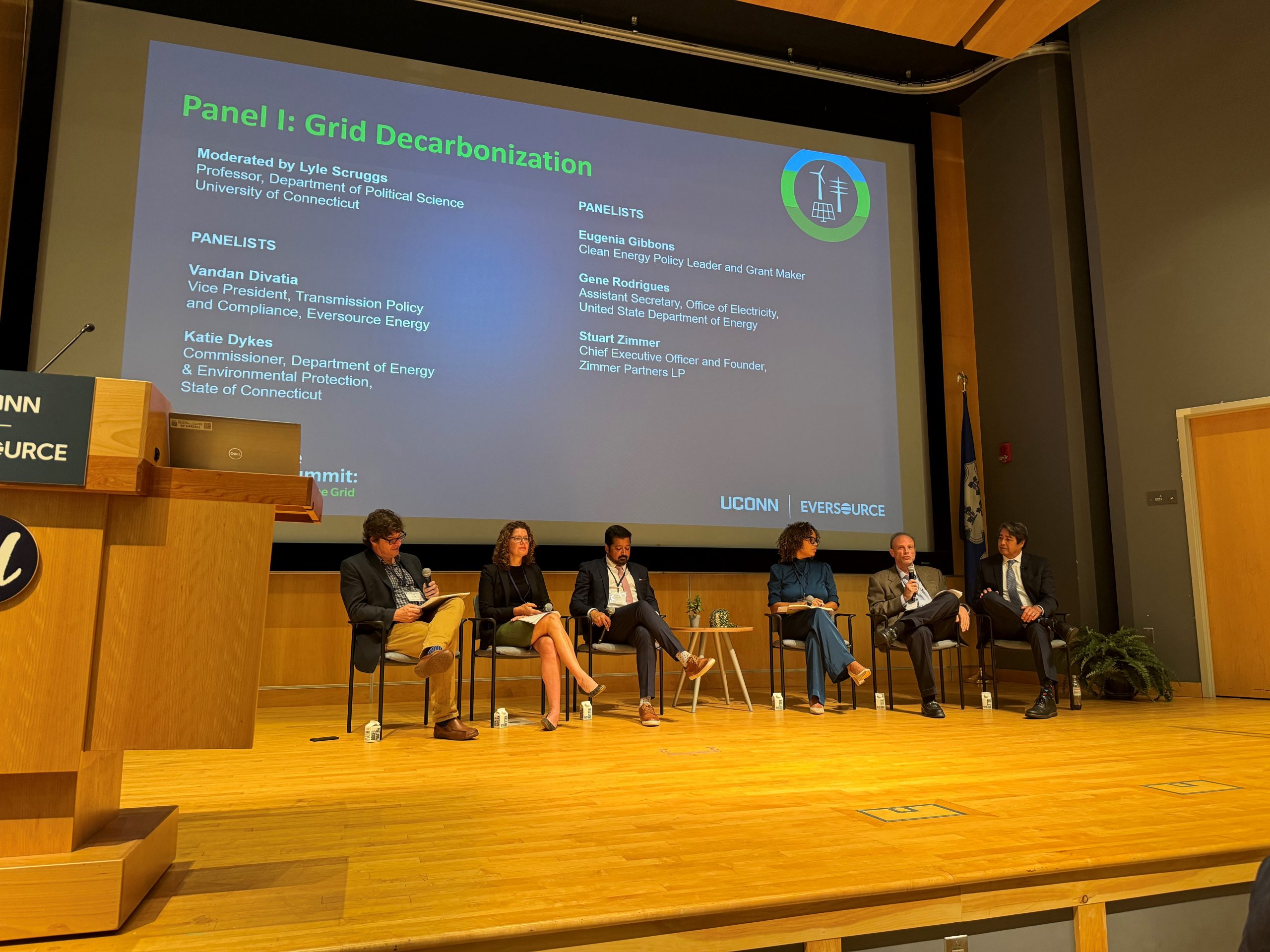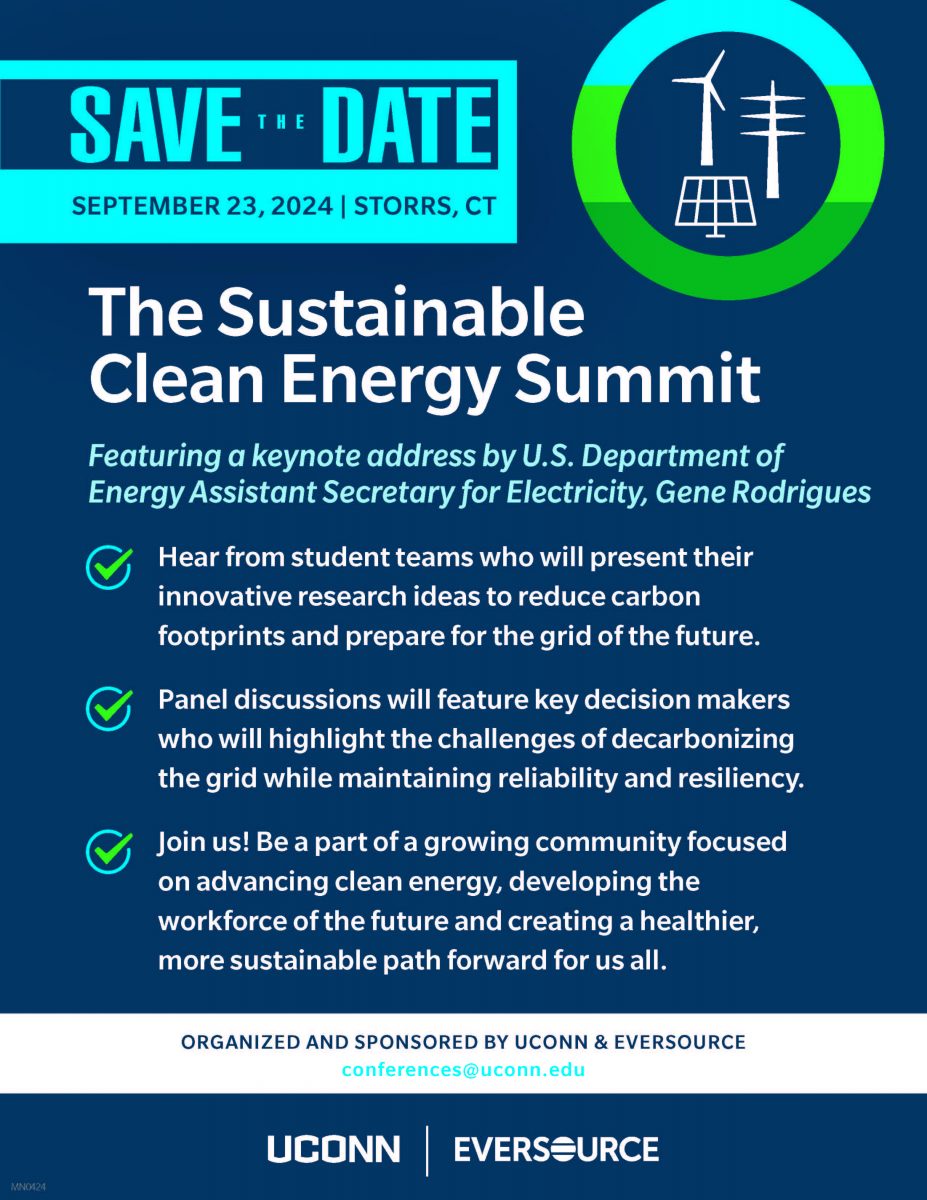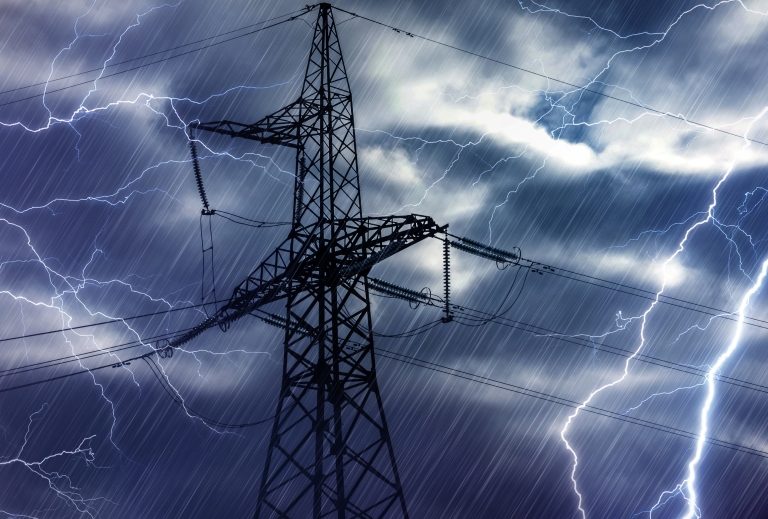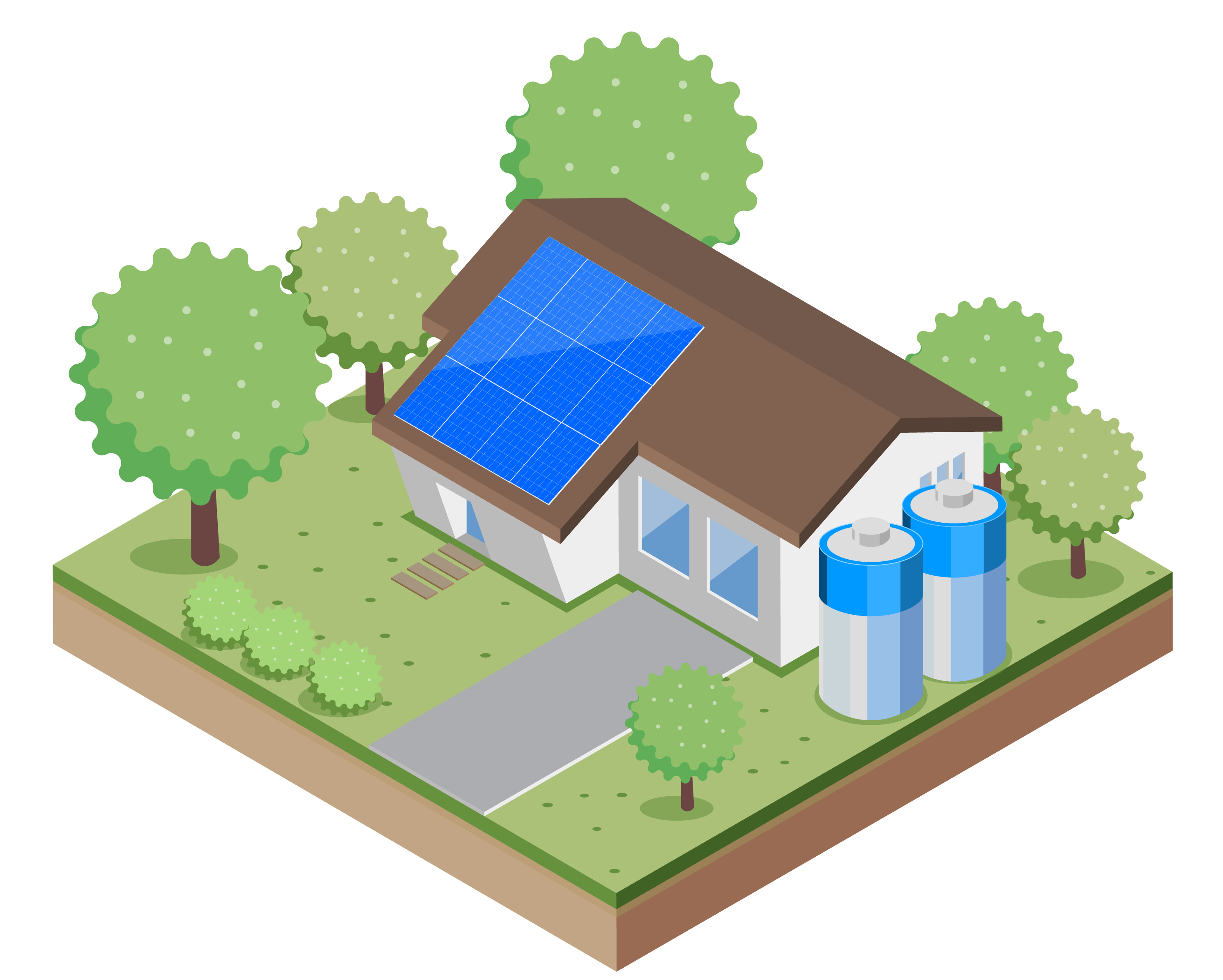More frequent and intense weather phenomena like heatwaves, windstorms, or atmospheric rivers often come in pairs and these challenging combinations stress the power grid and lead to outages.
Eversource
Clean Energy Summit 2024
 On Monday, September 23, 2024, UConn hosted the Sustainable Clean Energy Summit: Decarbonizing Society and the Grid in collaboration with Eversource. The event brought together over 300 UConn students, faculty, and attendees from state government, industry, and various organizations to discuss the future of sustainable energy.
On Monday, September 23, 2024, UConn hosted the Sustainable Clean Energy Summit: Decarbonizing Society and the Grid in collaboration with Eversource. The event brought together over 300 UConn students, faculty, and attendees from state government, industry, and various organizations to discuss the future of sustainable energy.
The Summit featured a keynote address from Gene Rodrigues, U.S. Department of Energy Assistant Secretary for Electricity, and included several thought-provoking panel discussions. Key milestones of the day included the announcement of the Connecticut Sustainable Energy Institute at Avery Point and the signing of a new three-year memorandum of understanding with Eversource to implement energy efficiency upgrades across all UConn campuses.
We also celebrated the achievements of UConn graduate students Zhiqing “Lucy” Li, Steven Matile, and Meshach Ojo, who were awarded the Clean Energy and Sustainability Innovation Program (CESIP) award for their innovative research on “Potential Micro-Hydropower Retrofits at Municipal Wastewater Treatment Plants.” Their project will receive additional funding from Eversource to support further exploration.
Key Takeaways from the Summit:
- Grid Reliability: The growing demands of artificial intelligence, transportation electrification, and overall increases in energy consumption highlight the critical need to maintain grid reliability.
- Accessible Clean Energy: The transition to a clean energy grid must be inclusive, with policies and investments that balance innovation and equity.
- Multifaceted Approaches: Building a cleaner, more resilient energy future requires the integration of advanced technologies and strong partnerships across sectors.
- Collaborative Planning: Effective transition to a more resilient energy system hinges on collaborative planning, partnerships between state and federal entities, and active engagement with academic institutions.
- Modernization Investments: Neglecting investments in modernization can lead to higher long-term costs, disproportionately affecting vulnerable populations.
For a more detailed overview and additional highlights from this year’s Summit, please visit the CLEAN EARTH Laboratory website.
Registration is Open! Sustainable Clean Energy Summit 2024 – September 23rd
Save the Date

Co-Hosts University of Connecticut and Eversource are partnering again to continue the dialogue on pressing equitable clean energy issues in the second Sustainable Clean Energy Summit on Monday, September 23, 2024, at the UConn Storrs campus. Last year’s turnout of 400+ students, faculty and energy professionals highlighted the need for continued collaboration and exploration of the shifting energy landscape. The summit will feature the second cohort of students participating in the Eversource-sponsored Clean Energy and Sustainability Innovation Program (CESIP). As part of this program, students are researching viable solutions (technical, social, and political) to address different aspects of the grand challenge of decarbonization and economic development in meeting ambitious climate goals.
UConn is proud and eager to announce that keynote speaker Gene Rodrigues, Assistant Secretary for Electricity, U.S. Department of Energy will kick off this year’s summit. Mr. Rodrigues brings both a technical expertise to creating a reliable and affordable power grid and serves as DOE’s senior official on the federal interagency working group for the White House Initiative on Asian Americans, Native Hawaiians, and Pacific Islanders. Panels with leaders from industry, government, and community organizations will follow and we will finish with a Clean Energy Fair (again!).
Please mark September 23 on your calendar. Registration information will be sent in late July. We hope to see you there!
Questions: contact University Events and Conference Services, conferences@uconn.edu.
Annual Eversource Energy Center Workshop 2024
 The Annual Eversource Energy Center (EEC) Workshop convened on February 9th at the Innovation Partnership Building and attracted over 80 participants from industry, government, and academia, including top New England utility companies Eversource, Avangrid, ConEdison, and National Grid, alongside others such as PECO (Exelon) and Hydro Quebec. Notable attendees also included ISO-NE, with responsibility for ensuring reliability and overseeing electricity markets across all of New England. Keynote speaker David Howard, Director of Grid Components at the U.S. Department of Energy Office of Electricity, addressed the gathering.
The Annual Eversource Energy Center (EEC) Workshop convened on February 9th at the Innovation Partnership Building and attracted over 80 participants from industry, government, and academia, including top New England utility companies Eversource, Avangrid, ConEdison, and National Grid, alongside others such as PECO (Exelon) and Hydro Quebec. Notable attendees also included ISO-NE, with responsibility for ensuring reliability and overseeing electricity markets across all of New England. Keynote speaker David Howard, Director of Grid Components at the U.S. Department of Energy Office of Electricity, addressed the gathering.
The workshop centered on EEC’s five research pillars, encompassing grid resilience and reliability, renewable energy, cyber-physical system security, and workforce training and outreach. The morning kicked off with presentations from UConn faculty showcasing nineteen ongoing funded projects spanning these topics, sharing progress with industry stakeholders, advisory board members, and colleagues.
Afternoon breakout groups provided the opportunity for in-depth discussion of the individual projects presented during the morning session. Researchers received valuable feedback on industry priorities and needs, discussed next steps, and shared insights on potential new research and funding opportunities.
According to Assistant Professor Diego Cerrai, Associate Director for EEC, “This was a fantastic day where we were able to network, reconnect, and exchange ideas.” Assistant Professor Xinxuan Zhang, EEC Center Manager, adds, “The afternoon session I participated in was extremely valuable for informing new ideas for my research. It was very inspiring to see the enthusiasm and engagement of my colleagues and industry partners.”
This robust framework is central to EEC’s continued success. EEC Center Director and UConn Tech Park Executive Director Emmanouil Anagnostou was delighted with the outcome. “The annual workshop is vital to the Eversource Energy Center’s power grid resilience and clean energy. It continues to build upon ongoing research and provides a critical foundation that enhances our prospects for future federal funding on climate resilience, smart grid, and sustainability as well as collaboration and co-sponsorships with industry.”
Eversource Energy Center Mission Statement and Pillars
Mission
To be the foremost energy utility-academia partnership advancing leading-edge interdisciplinary research and technology assuring reliable power during extreme weather and security events.
Pillars
To fulfill our mission, our center will focus the new EVERSOURCE-UConn partnership research activities over the next five years under the following five pillars:
1. Grid Resilience in a Warming Climate
2. Grid Reliability in a Changing Demand Environment
3. Renewable Energy Integration
4. Cyber-Physical System Security
5. Workforce training, outreach, and policy
About Eversource Energy Center
The Eversource Energy Center, a partnership between UConn and Eversource utility company, addresses resilience challenges in the energy sector, particularly regarding extreme weather, climate change, and clean power infrastructure. Housed at UConn’s Innovation Partnership Building, the Center leverages university resources to innovate and develop solutions for weather-related risks and security events. Supported by funding from various sources, including utilities, industry, and federal entities, the Center serves as a hub for interdisciplinary research, teaching, and workforce development. Emphasizing both technological advancement and people development, the Center supports student programs and diversity initiatives. EEC is committed to active collaborations driving innovation in storm preparedness, grid resilience, and modernization, inviting further participation in shaping the future grid.
UConn Receives DoE Grant Supporting Offshore Wind Grid Integration
Opportunity Lights Up UConn Sustainable Energy Summit
OPEN HOUSE at Eversource Energy Center’s RTDS Lab
 Loading...
Loading...
Six UConn Teams Innovating Decarbonization this Summer through Unique Eversource Partnership Program

Congratulations to the six finalists selected for The Clean Energy & Sustainability Innovation Program, a summer initiative backed by a UConn-Eversource partnership. These multidisciplinary student teams receive funding and support from faculty mentors and Eversource personnel to develop their proposed innovative strategies for achieving a sustainable future on local, state, and regional levels. We are excited to see their progress showcased at the Sustainable Clean Energy Fall 2023 Summit at UConn!
Read the full article in UConn Today: https://today.uconn.edu/2023/06/six-uconn-teams-innovating-decarbonization-this-summer-through-unique-eversource-partnership-program/